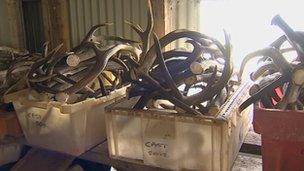Scots red deer 'breeding earlier due to climate change'
- Published
Scientists studying the effects of climate change on Scotland's red deer reveal the stags are growing heavier antlers
Scotland's red deer are breeding earlier each year, according to scientists studying the impact of climate change on the species.
It is thought to be the result of improved grazing, due to the longer growing season in spring and summer.
Scientists have been studying the red deer population on the Isle of Rum since 1953.
It is one of the longest running research projects of its kind anywhere in the world.
The climate change research is based on data gathered since 1980.
Timing events
Scientists monitor deer living in the north of Rum every day of the year and are able to identify the animals by sight.
Deer researcher Ali Morris told BBC Scotland: "In spring, the main things we're watching for are changes in the hinds' udders, as we're trying to work out if they're pregnant or lactating.

The researchers said they found deer antlers were also getting bigger
"We spend our time peering behind individual hinds' back legs."
The work may be unusual but it shows there has been a significant change in the timing of the red deer breeding cycle.
Prof Josephine Pemberton, of Edinburgh University, is one of the scientists leading the research.
She said: "We've found that several timing events have got a lot earlier, for example the calving dates have come forward by about 12 days.
"The rutting dates also come forward too, which is consistent with that, but also the antler casting and cleaning dates have come forward."
The rutting season on Rum, when the island's stags compete for a mate and, potentially, for their survival, has been followed by millions of viewers to the BBC's Autumnwatch series.
Prof Pemberton says those stags' antlers are also showing signs of change and, again, she believes there could be a link with climate change and the availability of improved grazing for the animals.
She said: "There may be an effect on actual antler size, because they're very sensitive to the grazing conditions in the year when they're being grown.
"We do, indeed, find that after you adjust for the age of the stag, the antlers are getting bigger."
The team of scientists from Edinburgh and Cambridge universities acknowledge that building up a more detailed picture of the impact of climate change on red deer will require more work.
But the results of their studies are already providing important information for the conservation organisations and sporting estates responsible for managing Scotland's red deer population.
- Published25 April 2013
- Published3 January 2013
- Published1 January 2013
- Published30 October 2012
- Published18 July 2012
- Published2 March 2012
- Published23 November 2011